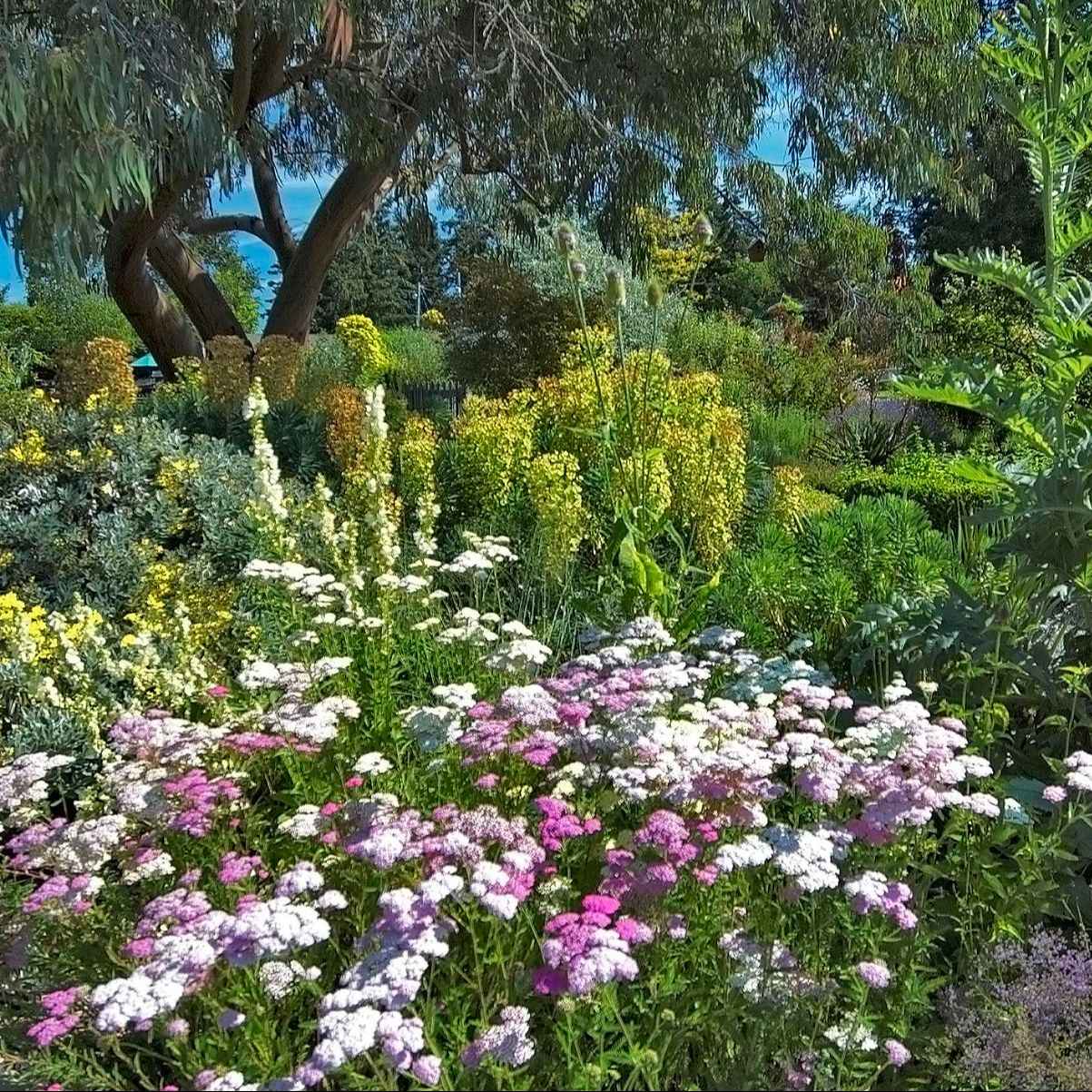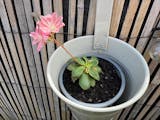Achillea millefolium 'Summer Pastels' - Achillea 'Summer Pastels'
Achillea millefolium 'Summer Pastels' - Achillea 'Summer Pastels'
Yarrow
5.0 / 5.0
(2) 2 total reviews
Couldn't load pickup availability
Achillea 'Summer Pastels' – Organic Hardy Perennial for Pollinators
A must-have for wildlife-friendly gardens, Achillea 'Summer Pastels' is a long-flowering, drought-tolerant perennial with soft, feathery foliage and clusters of delicate flowers in shades of pink, apricot, lemon, and soft lilac. Perfect for cottage gardens, prairie-style planting, and low-maintenance borders, this yarrow thrives in poor soils and attracts bees and butterflies throughout summer.
Plant Features
🌱 Height & Spread: Grows to around 60cm tall and spreads to 50cm, forming a compact but airy clump.
🍃 Foliage: Finely cut, aromatic green-grey leaves that look attractive even when the plant isn't in flower.
🌸 Flowers: Flat, umbrella-like clusters in soft pastel tones from early summer to autumn. The flowers are excellent for fresh and dried arrangements.
Growing Requirements
☀️ Sun Exposure: Prefers full sun but can tolerate light shade.
🌍 Soil: Grows best in well-drained, moderately fertile to poor soil. Avoid heavy, waterlogged conditions.
💦 Drought-Tolerant: Once established, it needs little watering, making it ideal for dry gardens.
Perfect Plant Partnerships
Achillea 'Summer Pastels' looks stunning when combined with:
🌾 Stipa tenuissima – for a soft, flowing contrast
🌿 Echinacea purpurea – bold daisy flowers to complement its pastel shades
🌼 Rudbeckia 'Goldsturm' – a late-season colour boost
🌾 Lavender – for a Mediterranean feel and additional pollinator attraction
🌸 Salvia nemorosa 'Caradonna' – deep purple spires that contrast beautifully
Why Grow Achillea 'Summer Pastels'?
✔️ Organic & Pollinator-Friendly: Grown in organic compost and grown and supplied in plastic-free. Perfect for sustainable gardeners.
✔️ Wildlife Value: Provides nectar for bees, butterflies, and other beneficial insects.
✔️ Long-Lasting Colour: Blooms for months with minimal care, adding soft pastel hues to your garden.
✔️ Low Maintenance: Cut back after flowering to encourage a second flush. Resilient to heat, dry conditions, and poor soil.
Gardeners Tips
✔️ Plant in spring or autumn for best results.
✔️ Space 40-50cm apart for a natural, informal look.
✔️ Deadhead spent blooms for prolonged flowering.
✔️ Leave some seed heads over winter for added interest and to support wildlife.
✔️ Divide clumps every few years to keep plants vigorous.
Achillea 'Summer Pastels' is a fantastic choice for eco-conscious gardeners who want effortless colour, pollinator support, and a naturalistic planting style. Whether in borders, gravel gardens, or prairie-style schemes, this organic yarrow will thrive with minimal care.
Plant care guide
Plant care guide
How do you plant perennials?
Dig a hole slightly larger than the woodfibre pot or balled rootball size, but no deeper. If it is a plant that likes to stay on the drier side (such as lavender), make the hole slightly shallower than the root ball so the surface of the rootball sits proud of the ground and use organic matter around the plant to stop water pooling on the base of the plant.
Water the hole and if the woodfibre pot or rootball doesn't seem moist pre-soak the pot or hessian contained rootball until it is saturated (no more bubbles rise to the surface).
There is normally no need to add compost to the hole if you have an established garden with healthy plants already growing. If you have a newbuild property or poor growth to existing plans chances are that your whole flowerbed needs improving with organic matter.
Place the pot or rootball in the hole. You can remove the hessian sacking it came in, or just remove the staple/twine and open the top once it's in the ground so the plant is free. The roots will easily grow through and the hessian will decompose, as will the woodfibre pots. Back fill the surrounding area with the dug soil. Do not firm the soil down hard! Roots need air and water and hard compacted soil prevents them from getting both.
Once planted water the plant in well and then water again whenever the soil starts to dry out under the surface, being careful not to overwater.
Mulching with something like woodchips around the plant after watering will help the soil to retain the moisture in hot weather. The perennial's foliage will die off in the winter and the plant will regrow through the mulch in the spring!
When to plant perennials in the UK?
Perennial plants can be planted out in the garden or in pots from spring, through the summer, to autumn. During dry weather and especially during the summer much closer attention needs to be given to watering in the first year.
If planting in hot weather, cut the foliage and flowers back. Your new plant will not be taking up much water until established so may struggle if the leaves lose more water than the roots can absorb. For the strongest result do not allow to flower or at least to set seed in the first year.
Where to plant perennials?
Check the plant info at the bottom of the page for the best place to position your new plant. If it prefers sun and you plant it in a north facing flowerbed next to a wall don't expect it to thrive or flower.
Pay attention to the soil. if it is heavy clay, incorporate organic matter such as compost to the soil before planting your perennial, preferably to the whole flowerbed. This will improve the soil by buffering it's water and nutrient holding ability. It is preferable to not just plonk compost in the bottom of the hole as it will not improve the overall condition of the soil surrounding your new plant. Do not add a layer of gravel or grit to the bottom of the hole as this will merely cause the perched water table to be higher. It will not improve drainage.
How do you care for perennial plants?
Cut back untidy foliage in the spring (you can leave the clippings on the flower bed to allow the nutrients to recycle into the soil). Divide every 3 to 5 years as the centre dies out and replant your extra plants! Perennials come back every year. Some are longer living than others.
Should perennials be fertilised?
The vast majority of garden soils contain plenty of nutrients, but if your garden is in a newly built development there is a good chance a thin layer of topsoil has been added on top of infertile subsoil. if that is the case, compost, soil improver or well rotted manure can be spread on the flower bed and dug in, or alternatively for those short of time or energy, organic fertiliser such as our own special organic mix of bone meal, hoof and horn and vinaase that is an organic, sustainable alternative to the John Innes formula, can be sprinkled around the plant with some compost added to the planting hole.
Delivery £5 flat rate or FREE over £50 spend.
Delivery £5 flat rate or FREE over £50 spend.
I charge a flat rate of £5 for postage and packaging to all of Britain, including the Highlands and the Isle of Man, with free delivery for orders over £50. We are unable to send plants to Northern Ireland.
I use Royal Mail for our deliveries as they have the lowest carbon footprint per parcel delivered in the UK and actually tend to look after parcels rather than just chucking them over the nearest fence! This ensures that your plants will have the best care possible.
Please have a Safe Place set up if possible so your plants are not returned to the sorting office if no one is home to accept the delivery.
I try to dispatch plants twice a week and you will receive updates by text or email. In cases of extreme weather or if Royal Mail has a hiccup the delivery may be delayed but we'll keep you in the loop.
I'm unable to deliver to the Channel Islands or Northern Ireland.
The LAWNMOWER Guarantee
The LAWNMOWER Guarantee
Healthy plants & happy customers
Your plant will only be dispatched if I'm happy it is healthy. The nature of growing the plants in large troughs means that the root system will be trimmed before they are balled in hessian, and therefore, depending on the time of year, the top growth may also be trimmed to make sure the roots are able to supply the water and nutrients your new plant requires.
Pruning encourages new growth and this applies to roots as well so a pruned plant actually results in a stronger plant.
The LAWNMOWER guarantee.
If you're not happy with your plants for any reason, even if you've run them over with your lawnmower, just pop them in a box (the plants, not the mower!) and post them back to us within 1 year for a replacement or refund.
This does not affect your statutory rights.
For full details check out the Refunds and Returns Policy.
Sustainability
Sustainability
Eco-friendly business
Fed up with plants grown in plastic pots which are doused in herbicides and sprayed with synthetic chemicals by big nurseries who merrily burn through finite resources, fly plants in from abroad on jet planes, irresponsibly use peat and coir, kill any insect nearby with non-selective pesticides and generally only think of the bottom line?
So are we!
How we grow plants sustainably
Our plants are started in coldframes or inside our house, grown-on woodfibre pots or in reclaimed wooden troughs which are then carefully harvested and balled and burlapped (hessian wrap securing the rootball), before packing plastic free in a eco cardboard box from a certified B-corp carbon neutral supplier. Some plants are grown in 8cm woodfibre pots.
Sustainable and organic compost & fertiliser
Our Soil Association certified organic compost is bought in bulk without plastic bags from Dalefoot Compost, and consists of sheep wool, bracken and comfrey. This naturally feeds the plants for 12 months. If supplemental feeding is required we only use our own special blend of organic fertilisers (bone meal, hoof & horn and vinaase) which have been processed with solar energy.
Carbon Neutral business
The small amount of electricity we use is from renewable sources and we irrigate our plants with stored water we have harvested. Plus, we are using our house and land for more than one purpose, preventing further land use and utilising the sunk carbon cost of the building rather than creating more.
We have partnered with Carbon Neutral Britain to offset our emissions, and recognise that we are not in control of all parts of the supply chain so have fully offset scopes 1, 2 and 3 to take that in to account - so that's all emissions connected to our business, from the farts coming out of the back of the sheep, to the carbon dioxide from the delivery van outside your door.
We don't just offset and carry on, ALL the decisions we make work to reduce emissions - for instance we use Royal Mail to post our plants as they have by far the lowest carbon footprint per parcel delivered in the UK.
Achillea millefolium 'Summer Pastels'

There’s literally really nothing like this service available elsewhere in the UK, as far as I know. Zero plastic and the plants lovingly individually wrapped in wood shavings. One small plant arrived almost dead (currently trying to revive it) but I’d ordered quite a few so maybe that is to be expected with the law of averages. The rest are doing well. Thank you guys, for your innovative service and for caring about the planet.
Wonderful nursery


